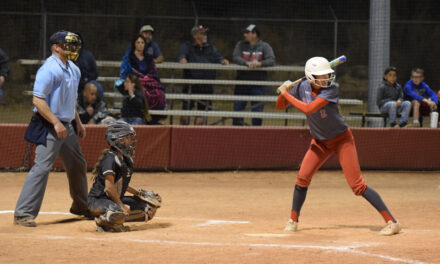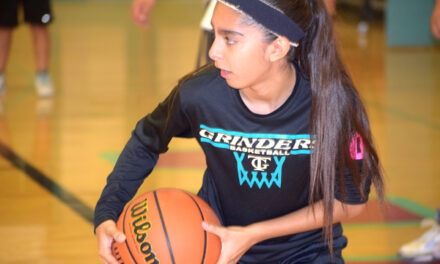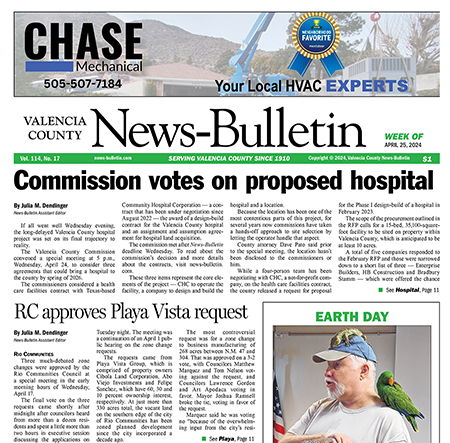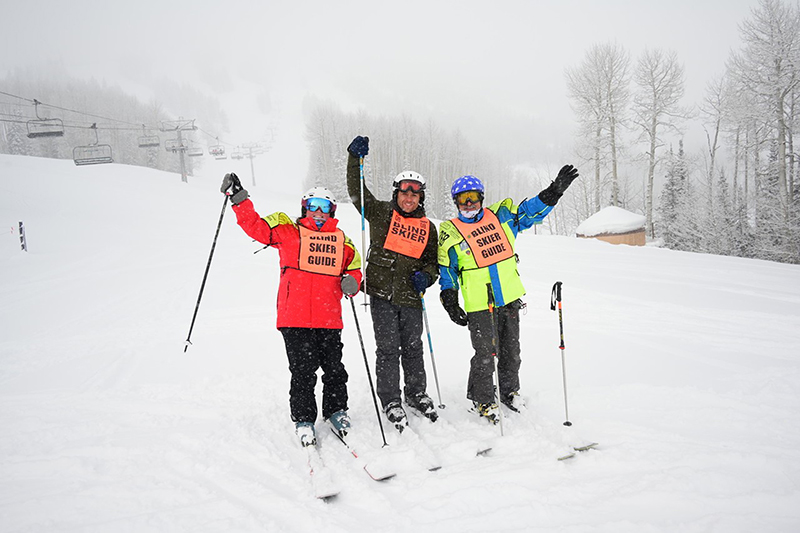
Submitted photo
Bob Bilodeau of Los Lunas, center, participated in several VA sports clinics for veterans with disabilities.
Los Lunas
What a thrill, zipping down a hill on skis or driving a snowmobile. Skippering a sailboat or surfing in the Pacific Ocean.
Those experiences have brought new perspective and additional joy into the life of 40-year-old Bob Bilodeau, of Los Lunas, who is legally blind.
Not that life had been boring for Bilodeau and his wife, Amanda, shepherding three young children, with a fourth due in August. However, the adventure has taken plenty of twists and turns in the past two decades.
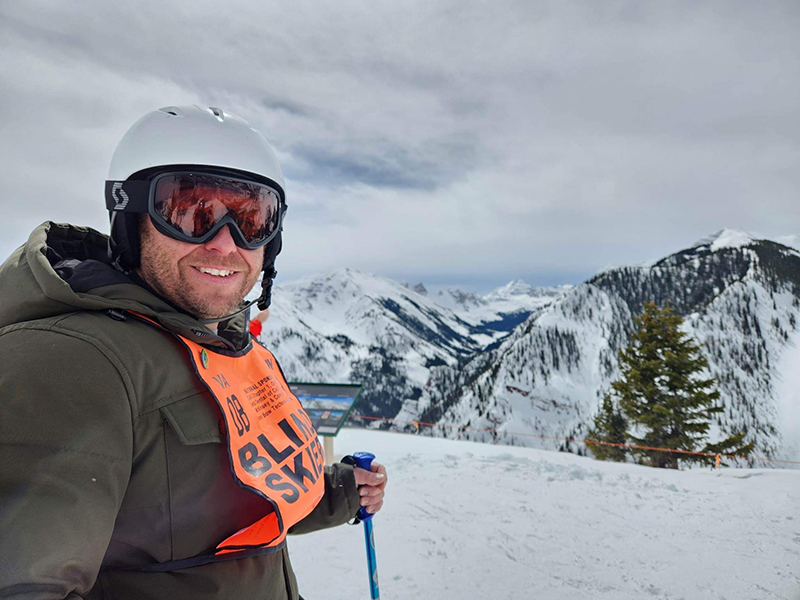
Submitted photo
Bob Bilodeau is legally blind because of a genetic birth defect.
After graduating from high school in Virginia, Bilodeau fulfilled a dream by immediately enlisting in the U.S. Army in 2000. In basic training, however, the warning signs about his vision started to emerge during nighttime exercises.
“Once we would go into the tree line, I had no night vision,” Bilodeau recalls. “I was definitely not functioning the way everyone else was.”
Along the way, Bilodeau heard from a drill sergeant who said, “he was afraid of the dark.” A health professional suggested he needed to “learn to walk in the dark, figure it out.”
Others whispered he was “faking it,” which, Bilodeau pointed out, “was inconsistent with everything else — my fitness scores, uniforms, following orders. All that stuff.”
After all, being a soldier was his ambition.
Eventually, tests at a base hospital revealed something. At Walter Reed Medical Center in Washington, D.C., that something was diagnosed as retinitis pigmentosa, a rare genetic birth defect with no cure.
Bilodeau recalls what the doctor said.
“He very bluntly told me, ‘Your days are done as far as the army, and you’re probably going to be blind when you’re an old guy.’ That was a lot to take in.”
Only a year and a half into Bilodeau’s dream job, he was discharged, leaving him “bitter, struggling, a mess — I was running amok.”
His ego took a hit.
“I was an 18-year-old kid with a machine gun one minute,” and then, “all my career plans went up in smoke,” he said.
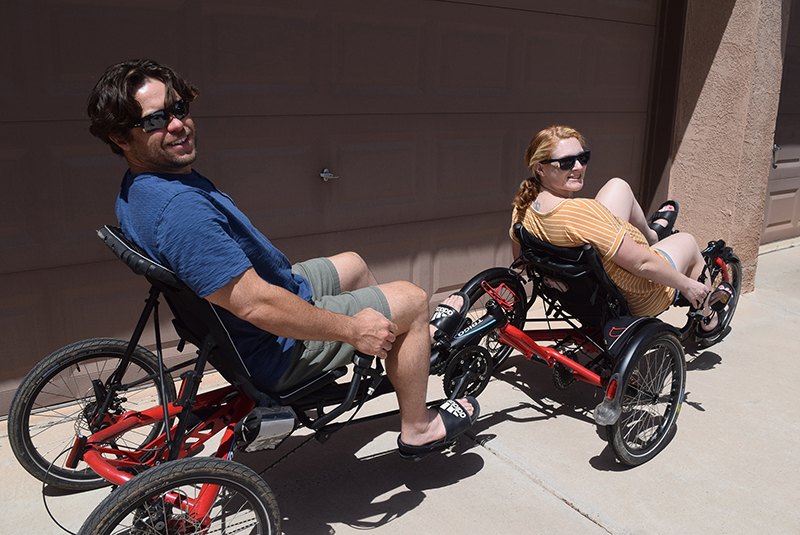
Mike Powers|News-Bulletin photo
Bilodeau and his wife Amanda enjoy riding their tandem recumbent bicycle.
Bilodeau, seeking a fresh start, eventually moved with two duffle bags to Albuquerque and lived with a buddy and his wife for a time.
Even as Bilodeau’s vision deteriorated and job prospects dimmed, the light started to shine. He met Amanda, a graduate of Cibola High School, got married 11 years ago, started a family and settled in Los Lunas.
While seated at the dining room table in their home, Bilodeau described the effects of RP.
“I can see your face, maybe your shoulders. Everything else is gone,” Bilodeau said. “I tell people I can spot a nickel on the other side of the room and trip over the couch going to get it.”
Amanda explained his condition to their children, “as looking through toilet paper rolls or straws,” unable to see up or down unless moving his head.
In recent years, Bilodeau rediscovered his athletic side through several Veterans Administration offerings, including cycling at the Southwest Blind Rehabilitation Center in Tucson, Ariz.
The couple, aided by the local VA, got a tandem recumbent bike — a true blessing during the COVID pandemic.
“It was one thing we could get out and do, especially for the two of us, without the kids,” Bilodeau said. “That was a big thing.”
Bilodeau also connected with New Mexico Adaptive Sports, a partner of the VA. He and other veterans would bus to Ski Santa Fe.
“The first time, it was so cool,” Bilodeau says about going down the mountain on adaptive skis. “It was cool finding out that I could do this — there’s constant feedback, a lot of communication,” with partners who guide the way. “They just make it work.”
Next up were two trips to the National Disabled Veterans Winter Sports Clinic in Snowmass Village, Colo., near Aspen, most recently in March.
“It was amazing,” Bilodeau said. “They take care of everything. They’ve got a medical team. Everybody is broken up into teams, leaders,” reminiscent of the camaraderie from his army days.
Bilodeau and more than 300 other veterans participated in activities that included alpine skiing and sled hockey, aided by 600 volunteers and 200 coaches.
The first year Bilodeau applied for the clinic, he actually backed out.
“He was too nervous — not feeling super confident,” Amanda remembers. “Then he went last year and couldn’t get enough of it.”
The winter experience led to a VA summer clinic in San Diego this spring.
“I got to drive a sailboat — I’ve never done anything like that,” Bilodeau said. “I don’t remember doing anything bigger than a shopping cart or a baby stroller,” drawing laughter from Amanda. “We’re all veterans. There’s a commonality there. Every one of us has something going on.”
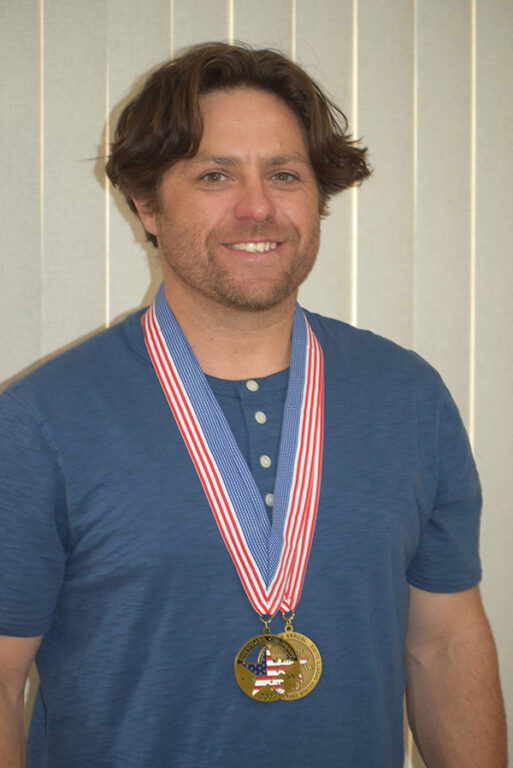
Mike Powers|News-Bulletin photo
Bilodeau has participated in both VA winter and summer camps for veterans with disabilities.
Bilodeau met a veteran with the same vision issue, visited with amputees and another with multiple sclerosis.
This exposure has been enlightening for the entire household. Amanda believes it has opened the door for family activities such as cycling and skiing.
“It always helps with mental health and staying positive. I think that’s how he counts his days. How many days to my next event?” Amanda said.
Bilodeau has gained enough confidence to use the New Mexico Rail Runner Express, planning to ride the train to Santa Fe this winter with his two oldest children and bus to the ski area.
“It’s pretty cool to have that to show my kids. ‘Dad can’t see and he’s still good at something.’”
With another child on the way, the adapting will continue. Like with their other children, the new addition will eventually wear bells as a toddler so dad won’t bump into them.
There have been some shenanigans from the kids, who learned they can hide from dad by remaining perfectly still, like the youngsters avoiding “the dinosaur in Jurassic Park.”
However, Bilodeau says the children “have a better sense for people who have a disability and are more likely to help.”
As research into a cure for retinitis pigmentosa continues, Bilodeau will do his part by staying active and healthy to try and slow the progression. He’s grateful the condition is painless and thankful for the opportunities that have arisen.
“At first, I was really sour and bitter about the military, the sense of loss,” he said, but now, at this point, the VA takes really good care of the family. It feels like everything has come full circle.
“I know that there are people out there who have my back, and people who are going to continue to coach me and teach me to develop these skills. I have that to look forward to.”
Mike Powers spent more than 40 years as a television news and sports anchor, mostly in the Albuquerque market. He has won numerous awards including New Mexico Sportscaster of the Year. He covers a wide range of sports, including the Valencia County prep scene.


